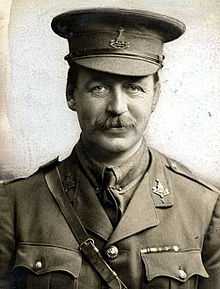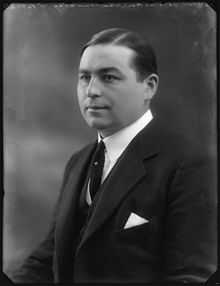Kingston upon Hull Central by-election, 1919
The Kingston upon Hull Central by-election, 1919 was a parliamentary by-election held for the British House of Commons constituency of Kingston upon Hull Central on 29 March 1919. The by-election was the second to be held during the 1918-1922 parliament.
Vacancy
The seat had become vacant when the Coalition Conservative Member of Parliament (MP) Sir Mark Sykes died on 16 February 1919 aged 39, a victim of the Spanish flu pandemic. He had held the seat since winning a the Kingston upon Hull Central by-election, 1911 on 5 July 1911.
Electoral history
The result at the last General Election in 1918 was;

| 1918 General Election[1]
Electorate 31,421 | |||||
|---|---|---|---|---|---|
| Party | Candidate | Votes | % | ±% | |
| Unionist | 13,805 | 80.1 | |||
| Liberal | Rev. Roderick Morris Kedward | 3,434 | 19.9 | ||
| Majority | 10,371 | 60.2 | |||
| Turnout | 17,239 | 54.9 | |||
| Unionist hold | Swing | ||||
- Received the Coalition Government 'Coupon'.
Candidates
- The Unionists selected 32 year old Lord Eustace Percy as their candidate to defend the seat. He was the seventh son of Henry Percy, 7th Duke of Northumberland, and Lady Edith, daughter of George Campbell, 8th Duke of Argyll. He was educated at Eton and Christ Church, Oxford. Percy had served in the Diplomatic Service since 1911. He had not seen war service. He was standing for parliament for the first time.
- The Liberals selected 33 year old Lt-Comdr. Joseph Kenworthy as their candidate to challenge for the seat. He was born at Leamington in Warwickshire and educated at the Eastman's Royal Naval Academy in Winchester. He joined the Royal Navy in 1902 and left the service in 1920 after serving in the Admiralty war staff in London. Kenworthy first tried to enter Parliament at the 1918 general election fighting Rotherham as a Liberal but came third.
Campaign
Polling Day was set for 29 March 1919, 41 days after the death of the former MP. Nominations closed to confirm that the election would be a two-way contest.
Percy immediately received the official endorsement of the Coalition Government.
As with the Leyton West by-election 6 weeks earlier, the dominant issue of the campaign was the idea being floated by the Coalition Government of retaining Conscription during peacetime. Kenworthy took a strong line in opposition to continuing conscription. He also argued against the imposition of impossible reparations against Germany. Percy's campaign did little other than express support for the Coalition Government.[2]
Result
According to reports in The Times newspaper, the by-election proved largely uneventful and the parties were expecting a small poll.[3] In the event there was a turnout of 51% which although on the lower end of the spectrum for by-elections of the day, was not the lowest experienced during the 1918–1922 Parliament.[4] Popular opinion was swinging against the coalition government of David Lloyd George and Andrew Bonar Law and particularly against the Conservative half of the coalition.[5] As a result, the Liberal candidate, Joseph Kenworthy, gained the seat for his party with a majority of 917 over his Coalition Conservative opponent, Lord Eustace Percy.

| Kingston upon Hull Central by-election, 1919[6]
Electorate | |||||
|---|---|---|---|---|---|
| Party | Candidate | Votes | % | ±% | |
| Liberal | Joseph Kenworthy | 8,616 | 52.8 | +32.9 | |
| Unionist | Lord Eustace Percy | 7,699 | 47.2 | -32.9 | |
| Majority | 917 | 5.6 | 65.8 | ||
| Turnout | 51.9 | -3.0 | |||
| Liberal gain from Unionist | Swing | +32.9 | |||
British Pathe has newsreel footage of Joseph Kenworthy taken after his election victory. http://www.britishpathe.com/video/commander-kenworthy/query/election
Aftermath
Kenworthy went on to hold the seat for the Liberals at the subsequent General Election. The result at the following General Election in 1922 was;
| 1922 General Election[7]
Electorate 35,037 | |||||
|---|---|---|---|---|---|
| Party | Candidate | Votes | % | ±% | |
| Liberal | Joseph Montague Kenworthy | 15,374 | 55.5 | +2.7 | |
| Unionist | Herbert William Looker | 12,347 | 44.5 | -2.7 | |
| Majority | 3,027 | 11.0 | +5.4 | ||
| Turnout | 27,721 | 79.1 | +27.2 | ||
| Liberal hold | Swing | +2.7 | |||
Percy was to find electoral success elsewhere and go on to sit in the Conservative Cabinet of Stanley Baldwin. The proposal for retaining Conscription during peacetime was quickly dropped.
See also
- List of United Kingdom by-elections
- United Kingdom by-election records
- Kingston-upon-Hull Central by-election, 1926
- List of United Kingdom by-elections (1918–1931)
References
- ↑ British Parliamentary Election Results 1918-1949, FWS Craig
- ↑ Trial By Ballot by Ivor RM Davies, p30
- ↑ The Times, 29 March 1919
- ↑ Chris Cook and John Ramsden, By-elections in British Politics; UCL Press, 1997 pp271-272
- ↑ The Times, 12 April 1919
- ↑ British Parliamentary Election Results 1918-1949, FWS Craig
- ↑ British Parliamentary Election Results 1918-1949, FWS Craig
- Craig, F. W. S. (1969). British parliamentary election results 1918–1949. Glasgow: Parliamentary Research Services. ISBN 0900178-01-9.
- Leigh Rayment's Historical List of MPs